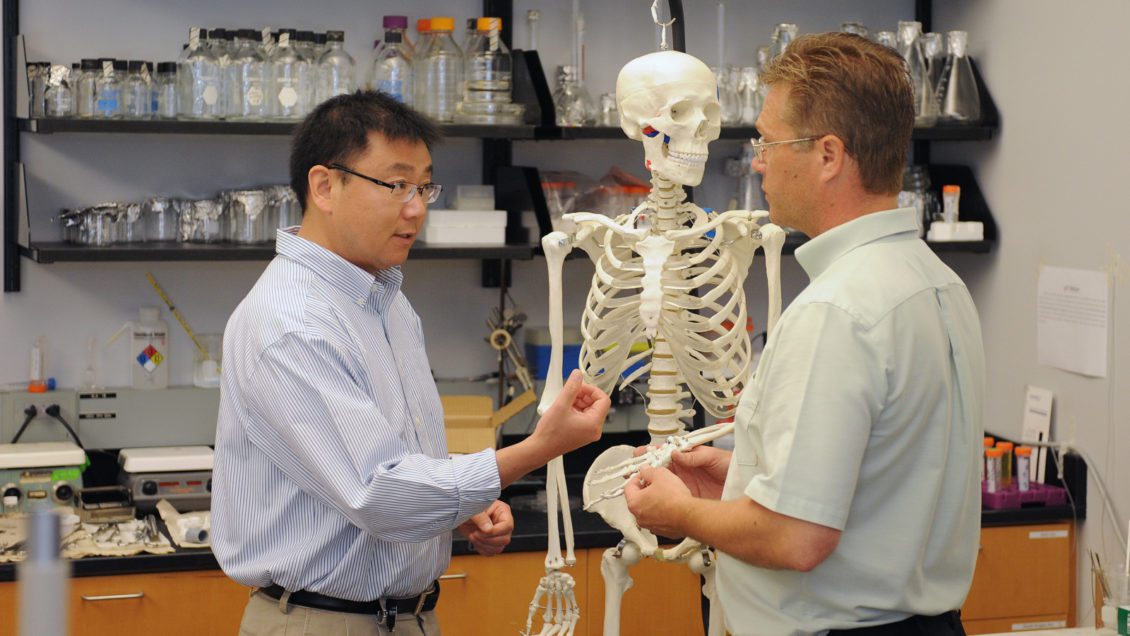A biomedical research center that is headquartered at Clemson University and has resulted in more than 400 publications in its first five years is entering its second phase with an $11.13-million grant.
The center is called South Carolina Translational Research Improving Musculoskeletal Health (SC-TRIMH). It is funded through a National Institute of General Medical Sciences program aimed at establishing Centers of Biomedical Research Excellence.

In the first phase, SC-TRIMH’s leaders established research cores in multiscale computational modeling, preclinical assessment and advanced fabrication testing. The number of participating investigators working in musculoskeletal health rose from 15 before the first phase to now more than 40.
They collectively have generated $40 million in new research grants, not including the $22.13 million from the National Institute of General Medical Sciences.
The SC-TRIMH director is Hai Yao, Clemson’s associate vice president for biomedical innovation, Ernest R. Norville Endowed Chair in Biomedical Engineering and professor of bioengineering.
“SC-TRIMH has been tremendously productive and innovative in the first phase,” said Yao, who has a joint appointment at the Medical University of South Carolina and serves as associate chair for the CU-MUSC Bioengineering Program. “Our multidisciplinary approach has positioned the center at the forefront of musculoskeletal health research. The second-phase funding is a testament to the hard work and dedication of our researchers.”
In the second phase, SC-TRIMH leaders aim to expand the critical mass of funded investigators conducting musculoskeletal research; strengthen innovative scientific cores that support and advance musculoskeletal research; and advance the ongoing development of an independent, sustainable, multidisciplinary thematic program.
Robert Jones, executive vice president for academic affairs and provost at Clemson, said SC-TRIMH supports the human-performance focus area of the Clemson Elevate strategic plan.
“The second-phase funding is not only advancing knowledge in the field of musculoskeletal health but also expanding research capacity for the entire state,” he said. “This is well-deserved funding, and I offer the team my congratulations
Centers of Biomedical Research Excellence (COBRE) are eligible for funding in as many as three phases. SC-TRIMH received $11 million in 2018 for its first phase, and the center’s leaders are already starting to plan to apply for third-phase funding.
SC-TRIMH has been a major force for collaboration across disciplines and institutions, with frequent partnerships among clinicians at Prisma Health.
“Our collaborations with SC-TRIMH have been transformative,” said Michael Kissenberth, clinical professor of orthopaedic surgery and sports medicine at Prisma Health and adjunct professor at Clemson University. “The innovative research cores have complemented our clinical practice, helping us advance patient care and outcomes in musculoskeletal health.”
The first-phase research project leaders were: Will Richardson, Feng Ding, Hugo Sanabria, Fei Peng, Kara Powder, Melinda Harman, Tong Ye and Yongren Wu. Second-phase researcher project leaders are: Shangping Wang, Zhaoxu Meng, Powder and Sarah Floyd.
SC-TRIMH is among four Centers of Biomedical Research Excellence at Clemson. The others are: the South Carolina Bioengineering Center for Regeneration and Formation of Tissues (SCBioCRAFT); the Eukaryotic Pathogens Innovation Center (EPIC); and the Center of Biomedical Research Excellence in Human Genetics.
Among those applauding the most recent SC-TRIMH grant was Tanju Karanfil, vice president for research, scholarship and creative endeavors at Clemson.
“Clemson has proven success leading large-scale, interdisciplinary Centers of Biomedical Research Excellence that are generating innovations in healthcare diagnostics, treatment and delivery,” Karanfil said. “This continued investment underscores the high-level impact that SC-TRIMH is having and will further catalyze its mission.”
Research reported in this publication was supported by the National Institute of General Medical Sciences of the National Institutes of Health under Award Number 2P20GM121342-06. The content is solely the responsibility of the authors and does not necessarily represent the official views of the National Institutes of Health.
Get in touch and we will connect you with the author or another expert.
Or email us at news@clemson.edu

